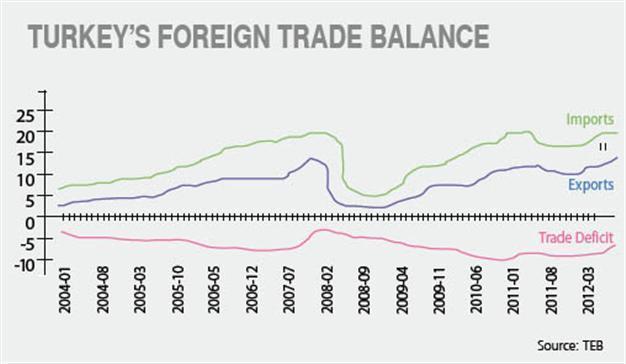Exports to Europe slow down as trade gap narrows
ISTANBUL
 Turkey’s trade gap narrowed 20 percent in the first seven months of the year from last year, falling to $50.7 billion. However, a sharp fall in exports to Europe, its largest market, is increasingly encouraging the country to diversify its foreign trade, figures released yesterday by the Turkish Statistical Institute (TÜİK) showed.
Turkey’s trade gap narrowed 20 percent in the first seven months of the year from last year, falling to $50.7 billion. However, a sharp fall in exports to Europe, its largest market, is increasingly encouraging the country to diversify its foreign trade, figures released yesterday by the Turkish Statistical Institute (TÜİK) showed. Turkey’s chronic gap fell to $7.9 billion in July, some 14.3 percent down from the same month a year earlier. Exports to European Union countries constituted some 47.7 percent of total foreign sales last year, but this share has fallen to 34.3 percent, raising hopes that the foreign sales portfolio was diversifying. Along with the diversification in markets, the trade gap narrowing comes out of the fall in sales to EU members to $4.42 billion.
Minister confident
Turkey will grow in the third and fourth quarters with the help of exports, Economy Minister Zafer Çağlayan said in a note on the TÜİK figures yesterday.
“We are increasing exports by diversifying markets,” he said. The 12-month cumulative trade deficit fell to $93.3 billion from $94.6 billion in June. Similarly, the 12-month cumulative non-energy trade deficit fell to $42.billion from $43.2 billion. On a seasonally-adjusted basis, exports contracted by $1.1 percent month on month, while imports declined by 1.7 percent.
“July’s trade data shows that the negative impact of the slowdown in the EU on Turkey’s exports is deepening, while exports to the Middle East and North Africa are leveling off,” lender TEB said in a note to investors yesterday. “Therefore, subdued external demand is likely to restrain export growth in the coming period. Also, due to the slowdown in domestic demand, non-energy imports are likely to remain flat in the third quarter, before picking up later in the year on the back of ongoing monetary easing,”
Turkey’s energy imports fell 9.6 percent in July. Imports excluding energy and gold were $14.4 billion in July, little above the $14.1 billion in June. Energy imports contracted to $4.4 billion, mainly due to the delayed impact of the decline in global oil prices.
Russia, from which Turkey buys a large amount of natural gas, was the top importer to Turkey in July, with a 35.8 percent increase to $2.42 billion. Germany and China followed.
The $1.83 billion worth gold sales to Iran contributed to a 8.5 percent increase in overall exports to $12.87 billion.
















